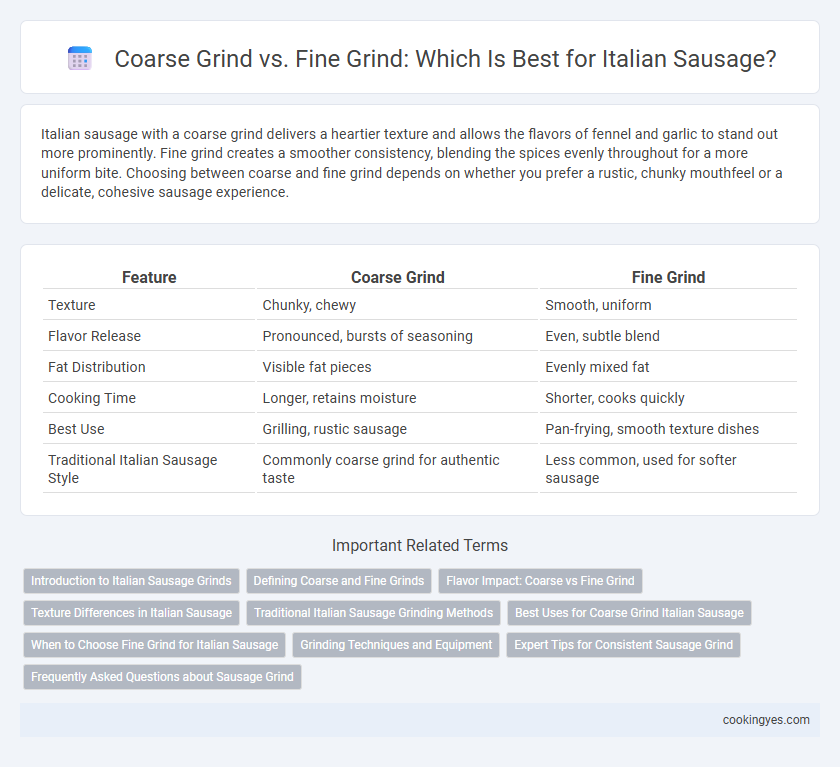Italian sausage with a coarse grind delivers a heartier texture and allows the flavors of fennel and garlic to stand out more prominently. Fine grind creates a smoother consistency, blending the spices evenly throughout for a more uniform bite. Choosing between coarse and fine grind depends on whether you prefer a rustic, chunky mouthfeel or a delicate, cohesive sausage experience.
Table of Comparison
| Feature | Coarse Grind | Fine Grind |
|---|---|---|
| Texture | Chunky, chewy | Smooth, uniform |
| Flavor Release | Pronounced, bursts of seasoning | Even, subtle blend |
| Fat Distribution | Visible fat pieces | Evenly mixed fat |
| Cooking Time | Longer, retains moisture | Shorter, cooks quickly |
| Best Use | Grilling, rustic sausage | Pan-frying, smooth texture dishes |
| Traditional Italian Sausage Style | Commonly coarse grind for authentic taste | Less common, used for softer sausage |
Introduction to Italian Sausage Grinds
Italian sausage grinds vary primarily between coarse and fine textures, each impacting flavor and cooking performance. Coarse grind uses larger meat pieces, offering a hearty, rustic texture typical of traditional Italian sausages rich in fennel and garlic. Fine grind produces a smoother, more uniform mixture ideal for softer sausages used in pasta dishes or as fillings, balancing spice distribution with tender bite.
Defining Coarse and Fine Grinds
Coarse grind for Italian sausage features larger, irregular meat pieces, enhancing texture and mouthfeel with a hearty bite. Fine grind produces a uniform, smooth consistency, ensuring even seasoning distribution and a tender, cohesive sausage. Choosing between coarse and fine grinds depends on desired texture and cooking method, influencing the overall eating experience.
Flavor Impact: Coarse vs Fine Grind
Coarse grind in Italian sausage creates a hearty texture that enhances the pork's natural flavors and allows spices like fennel and garlic to stand out more distinctly. Fine grind produces a smoother, more uniform sausage, intensifying the integration of spices for a consistent, bold taste throughout. The choice between coarse and fine grind significantly affects the flavor experience, with coarse grind offering a rustic, robust profile and fine grind delivering a refined, concentrated seasoning.
Texture Differences in Italian Sausage
Coarse grind in Italian sausage creates a chunkier texture with distinct pieces of meat and fat, enhancing the sausage's juiciness and chew. Fine grind results in a smoother, more uniform texture, allowing spices to blend seamlessly and providing a consistent mouthfeel. Texture differences influence cooking methods and flavor release, with coarse grind suited for rustic dishes and fine grind ideal for delicate applications.
Traditional Italian Sausage Grinding Methods
Traditional Italian sausage grinding methods emphasize coarse grind to preserve the texture and enhance the mouthfeel of the sausage, allowing the fat and meat to blend distinctly for a robust flavor profile. Coarse grinding maintains the integrity of the pork cuts, ensuring a juicy and hearty bite typical of authentic Italian sausages. In contrast, fine grind results in a smoother consistency but can diminish the traditional texture and layered taste that define classic Italian sausage recipes.
Best Uses for Coarse Grind Italian Sausage
Coarse grind Italian sausage is ideal for recipes where texture and bite are essential, such as in rustic pasta sauces, grilled Italian sausage links, and sauteed dishes. The larger meat pieces provide a hearty mouthfeel and hold their shape well during cooking. This grind is also preferred for stuffing peppers or making sausage patties where a robust texture enhances the overall dish.
When to Choose Fine Grind for Italian Sausage
Fine grind for Italian sausage is ideal when creating a smoother texture that blends seasonings uniformly, especially in dishes like pasta sauces or fillings. Choose fine grind when you want the sausage to integrate seamlessly into recipes, ensuring even cooking and consistent flavor distribution. This texture also works well for delicate preparations such as sausages in casseroles or stuffed peppers.
Grinding Techniques and Equipment
Coarse grind for Italian sausage results in a chunkier texture, achieved using larger plate holes on meat grinders or dedicated coarse grinding attachments, which preserve fat distribution and enhance juiciness. Fine grind produces a smoother, more uniform sausage, ideal for delicate flavor blends, using smaller plate holes or a secondary pass through the grinder to ensure consistent particle size. Modern grinding equipment with adjustable settings allows precise control over grind size, improving texture and mouthfeel while optimizing seasoning absorption in traditional Italian sausage recipes.
Expert Tips for Consistent Sausage Grind
For a consistent Italian sausage grind, experts recommend selecting the grind size based on the sausage's intended texture and cooking method: a coarse grind preserves a chunky texture ideal for grilling, while a fine grind ensures uniformity and better binding for sausages used in pasta or sauces. Always keep meat and equipment well-chilled to prevent fat smearing and maintain grind consistency. Using calibrated grinders with sharp blades and grinding meat twice can achieve optimal texture and flavor integration.
Frequently Asked Questions about Sausage Grind
Coarse grind Italian sausage offers a chunkier texture that enhances the mouthfeel and retains meat juices during cooking, making it ideal for rustic dishes like sausages and meatballs. Fine grind results in a smoother, more uniform texture preferred in delicate preparations such as pasta sauces and spreads. Understanding these differences helps home cooks and chefs achieve the desired consistency and flavor release in their Italian sausage recipes.
Coarse grind vs fine grind for Italian sausage Infographic

 cookingyes.com
cookingyes.com